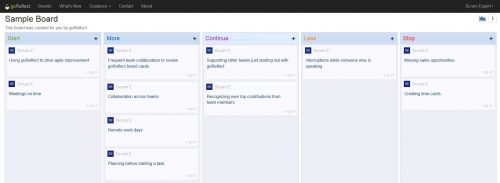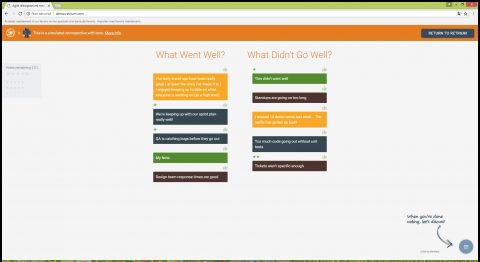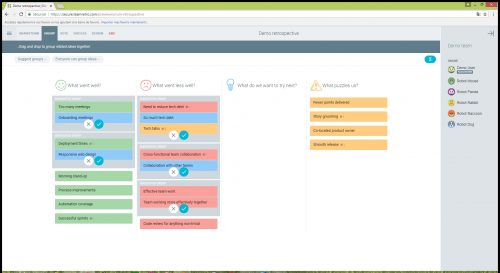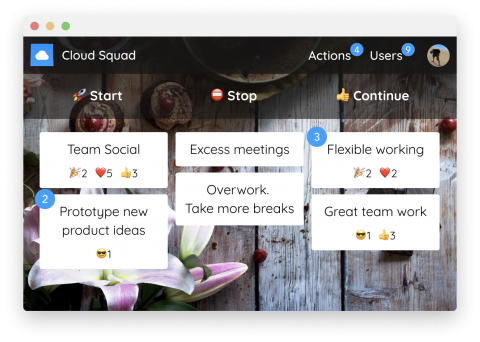Many Scrum teams are based on a distributed organization where members are in different locations, countries or time zones. How could these Agile teams perform their retrospectives? Some companies have developed online tools that can be used to facilitate retrospectives for distributed Scrum teams.
This article presents only online commercial tools that can be used to facilitate Agile retrospectives, as we have already produced a list of free retrospective tools for distributed Scrum teams. We mention only tools that have features specifically dedicated to Scrum retrospectives. If you want to add a tool that fits these requirements to this article, just let us now using the contact form.
Updates
April 24 2023: added: EasyRetro, RetroCadence, RetroTeam, RetroTool; removed: inRetro, Retrospectus (not available anymore)
September 9 2019: added: Parabol, Sprint Board, Retro Rabbit, RetroTime, TeleRetro, Trune; RealtimeBoard renamed as Miro
EasyRetro
EasyRetro is an intuitive and easy-to-use tool for agile teams to do online sprint retrospectives. EasyRetro focuses on being extremely easy to use and requiring in most cases no onboarding in order for people to get up to speed with it. EasyRetro is focused on being anonymous and providing a safe psychological environment for people to be able to open themselves and share their feedback. The tool is very simple but at the same time very powerful and customizable. You can enable multiple features like gifs, the ability to upload images, surveys, and Facebook-like reactions. You can customize most of the aspects of the board like votes, hiding cards, disabling features, etc…
EasyRetro also provides much more than just sprint retrospectives, it is a great tool for brainstorming, feedback collection, team building, and many more use cases. The platform offers a diverse range of more than 250 pre-defined templates, ensuring every retro session is unique and engaging. EasyRetro is the go-to retrospective tool trusted by thousands of companies worldwide.
Website: https://easyretro.io/
goReflect
goReflect is a free online retrospective tool that is based on the starfish model for retrospectives using Start, More, Continue, Less and Stop. You can create as many boards and invite as many board members as you like. You can also be invited to other boards by other goReflect users. When creating a board, you can choose from one of three predefined templates or create your own with the custom template option. Once a board is created, it’s template cannot be changed. Each board requires a title, and since the board is perpetual, using the team’s name is often a good choice, but the choice is yours. goReflect wants to promote a continuous and real-time approach to retrospectives so that a board is always active, so it spans multiple sprints, iterations, etc.

Website: https://www.goreflect.com/
Miro
Miro (formerly RealtimeBoard) aims to provide engaging collaboration for distributed and co-located teams regardless of locations and time zones. There are many preset retrospectives formats like “start/stop/continue” or the 4L (liked/learned/lacked/longed for). You can vote on ideas with a special plugin. The tool also offers other features besides retrospectives, like story mapping or UX research (customer journey map). You can create and discuss anything together just like you are in one meeting room standing in front of a whiteboard. You can invite people through email or slack. There is an unlimited free version with limited features up to 3 editable boards for unlimited teams members.
Website: https://miro.com/agile/

Parabol
Parabol is a retrospective meeting app for agile teams or anyone interested in creating continuous improvement. It is designed to put in-person and remote participants on equal footing. Every phase of the meeting can be done together, and brainstormed items always remain anonymous to encourage full disclosure. Parabol automatically generates a meeting summary delivered to all stakeholders via email or Slack, which details what has been discussed, and who is accountable for what. It integrates with Atlassian Jira and GitHub seamlessly export tasks for easy follow-through on improvements. There is a free version up to two teams.
Website: https://www.parabol.co/
Retrium
When you signup, you are automatically placed in a free trial plan and your first 30 days of using Retrium are free. You start by creating a list of what went well (or not). Then you can group the items and vote for them. Finally, it is time to create some action list for improvement.
Website: https://www.retrium.com/

RetroCadence
RetroCadence is a powerful retrospective and meeting facilitation application, unlimited participants, unlimited boards, unlimited themes, and enterprise SSO ready. There is a free and an enterprise edition that includes everything from the free version, plus additional features. RetroCadence allows a board to easily be shared with the team by use of a private URL, allowing team members to easily add their thoughts to an ongoing retrospective with one click of the mouse. This means that facilitators can spend more time focussing on driving improvements within their teams and facilitating retrospectives, rather than administering a user list in a retro tool. It also means that it is very easy to spin up an ad-hoc retro board at a moments notice.
This allows you to do a lessons learned or “post mortem” on an initiative that went well, or not so well, and involve members of the wider organization who might not normally have access to a retro tool. RetroCadence has been designed to be focussed on grouping retrospectives into team categorisations to allow you to easily administer your separate teams and avoid unnecessarily sharing retro feedback between teams. RetroCadence makes it easy to mark a submitted comment as an action item, and then once marked, allows an easy method for tracking your action items, including when they were raised and which team they are assigned to, in order to ensure that they get completed. This makes sure that these valuable improvement ideas get implemented within your organization so that you can start confirming their validity and reaping the benefits.
Website: https://retrocadence.com/
RetroTime
RetroTime is a online tool that allows creating a retrospective and invite your team, and start your retro. Once your team has completed feedback, show the comments and start the conversation on how to improve. Whether you want to respect privacy or ensure new and independent thoughts, RetroTime Hidden Comments will allow you to collect feedback while keeping your team anonymous. RetroTime basic version is free.
Website: https://retroti.me/
RetroTeam
RetroTeam is an online platform that Scrum teams can use to conduct fun and effective retrospectives. The features include creating a board and card, inviting participants, settings to turn on timer, and export retrospectives to PDF. RetroTeam lets you seamlessly run Scrum retrospectives with small to large Agile teams. A free plan is available for small teams.
Website: https://retroteam.app/
RetroTool
RetroTool is an platform that provides all the features you need to run an online retrospective with a remote or hybrid team. You can create as many columns, cards and action points as you need to fulfill the purpose of your retrospective meeting. You should also invite every participant that counts as they are the most essential ingredient to a great success of your retrospectives.
Website: https://retrotool.io/
Retro Rabbit
Retro Rabbit tries to solve issues with other tools. For instance with Retro Rabbit teams can continuously submit notes for their upcoming retrospective from day one. Anonymous note submission allows every voice on the Scrum team to be heard equally and fairly. Retro Rabbit has a feature for asynchronous retros can cut out the entire submission process and cut your meeting time. There if a free version of Retro Rabbit allows unlimited retrospectives with up to 10 team members.
Website: https://retrorabbit.io/
Sprint Boards
Sprint Boards is a online tool for Scrum retrospectives. This tool is built with Bootstrap 4 and Vue and pays special attention to keyboard shortcuts that developers should appreciate. There are keyboard shortcuts for adding and saving cards, and a double-click shortcut to quickly edit a card. When you have finished your retrospective, you can lock your board to prevent somebody to make further changes. This is great for Scrum masters that need to review past retros.
Website: https://sprintboards.io/
TeamRetro
TeamRetro is an enterprise-ready online agile retrospective meeting tool for agile coaches, scrum-masters and teams. Retrospectives can follow multiple formats (Start Stop Continue, Anchors & Engines, Starfish, Mad Sad Glad, 4Ls). It offers multiple ways to invite members to retrospectives. All your actions are created in a single list that you can track from meeting to meeting. Team members get a gentle reminder before actions are due. Tick off completed tasks and show some love at your next retro. The trial period is based on 3 retrospectives.
Website: https://www.teamretro.com/

TeleRetro
TeleRetro is an online tool for running sprint retrospectives for distributed Agile teams. TeleRetro is simple and easy to use, and it stands out with its appealing design. It has been built to allow unimpeded critical discussions, and to support teams where they need it most – collecting feedback; capturing, tracking & reviewing actions; preparing proven sprint retro formats; generating automated retro statistics; and being fully customisable, even down to the background image. TeleRetro helps to set the tone for the retro with ‘Ice-breakers’ which lets facilitators play music or video directly from the board with tools such as YouTube and SoundCloud. Once a board is created, anyone can participate via a retro link without the need to sign in. TeleRetro offers both free and paid plans.
Website: https://www.teleretro.com

Trune
Trune is an online tool that provides a safe and secure place for Agile team to engage in clean and effective ways to get feedback via retrospectives, radars or statistics. Trune is not just about retrospectives; you can also explore agility health radars. Tools for agility health radars can cost up to thousands of dollars a month. With Trune, you can assess your Scrum team’s health in an effective and engaging way for a fraction of the cost of other tools.
Website: https://www.trune.io/


